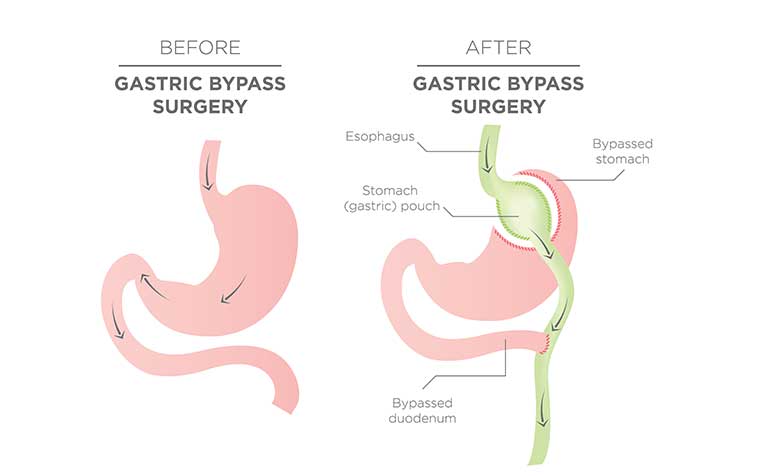
Gastric bypass surgery helps reverse diabetes and other metabolic disorders.
Gastric bypass, a form of weight-loss surgery, helps two patients battle diabetes, obesity and other illnesses
Mr S, 32, and Ms R, 36, used to tip the scales at over 100kg.
Meet them today and you probably won’t be able to tell that they used to be obese. That’s because both of them underwent gastric bypass, a form of weight-loss or bariatric surgery effective in reversing diabetes and other metabolic disorders. To help fight their obesity, diabetes and accompanying illnesses, Mr S and Ms R underwent the operation at Singapore General Hospital (SGH), a member of the SingHealth group, in late 2011.
“In the past, I couldn’t walk long distances and didn’t dare take the MRT and public buses. This operation has given me a whole new life,” said Mr S, who now runs, swims and goes to the gym regularly. “And, after more than 30 years, I can now say ‘no’ to food.”
Mr S weighed 117kg and had a body mass index (BMI) of 35 when he went under the knife last November. He now weighs 85kg.
Ms R, who was considered “superobese” with a BMI of 50, went from 128kg to her current 93kg after her bariatric procedure in September last year.
Both are now off the medication they were previously taking for diabetes, high blood pressure, cholesterol and treatment for obstructive sleep apnoea (OSA).
Vast improvement in health after gastric bypass
Mr S had terrible fasting blood sugar levels – 15.5mmol/L at their worst – two years ago, but they plummeted to a healthy 5.7mmol/L during a recent blood test. Ms R’s three-monthly sugar level, also known as glycated haemoglobin or HbA1c, was as high as 8.6 per cent last year. Six months after surgery, it was well in the normal range at 5.7 per cent. Considering that they no longer take diabetes medication, the new levels were remarkable.
Plus, Mr S no longer snores and Ms R no longer suffers from OSA – a condition in which a person stops breathing periodically as the breathing passage shuts during deep sleep.
But the road to gastric bypass was not easy. Both had to go through rigorous interviews and counselling at the SGH Lifestyle Improvement and Fitness Enhancement (LIFE) Centre. Staffed by a multidisciplinary team of doctors, dietitians, physiotherapists, psychologists, occupational therapists and medical social workers, the centre promotes integrated and holistic care for patients with lifestyle related medical conditions, such as eating disorders and obesity.
“He was first referred to the Diabetes Centre at SGH as a 19-year-old after he was diagnosed with type 2 diabetes during his national service pre-enlistment screening,” said doctors.
“He was a typical diabetic. He battled with his weight for a long time. He would lose 10kg and bounce back with a 15kg weight gain. He had been seeing us for a good seven years. Then he disappeared off the radar and came back about a year later with very poorly controlled diabetes. His blood pressure was high and his cholesterol levels were off the charts. I said, ‘Look, you are young and you can’t go on like that. You are a candidate for a heart attack at 40.’ And that was when we discussed surgery.”
For Ms R, the turning point came a year later when she was in and out of the hospital four times for a host of medical problems which included diabetes, inflamed stomach ulcers, sleep apnoea and an ovarian cyst.
Fed up that her weight was causing her so many problems, she opted for gastric bypass. “I told my husband, ‘I don’t care if you allow me to or not, I am signing the consent form for the surgery.’”
Such determination and commitment is key when assessing patients for bariatric surgery, say doctors from LIFE Centre, Singapore General Hospital (SGH), a member of the SingHealth group.
“There is a common misconception that the operation will fix everything and, after that, you will go on with your life. But that is not true. The surgery is a reset button and, after that, you embark on a new life, not just in terms of eating but your whole approach to life.”
Patients who go to the LIFE Centre learn to modify their eating habits. “We talk about eating, selecting food and being relaxed. They need to understand that these are important and they need to make changes. Undergoing surgery to lose weight will help them only 20 to 30 per cent of the way,” doctors said.
Bariatric procedures – whether it is a gastric bypass, gastric lap band surgery or gastric sleeve surgery – are doomed to fail if patients do not make dietary and lifestyle changes, he added. They could regain all the weight they worked so hard to lose in the first place.
Ref. T12
Contributed by














 Get it on Google Play
Get it on Google Play